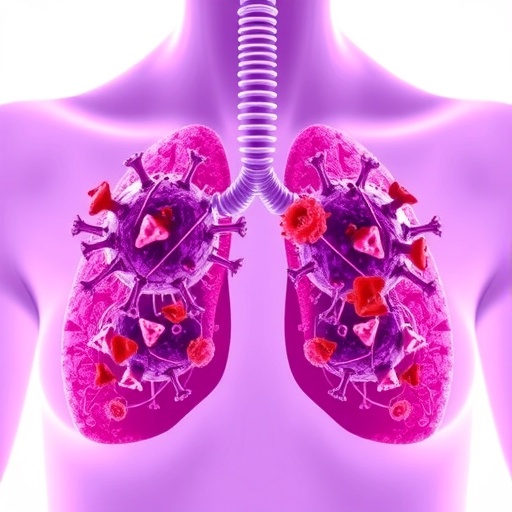
In groundbreaking research that bridges infectious disease and oncology, scientists have uncovered compelling evidence that respiratory viral infections, including SARS-CoV-2, can trigger the awakening of dormant metastatic breast cancer cells in the lungs. This discovery illuminates a previously unknown interplay between viral-induced inflammation and cancer progression, potentially reshaping our understanding of cancer metastasis and patient risk in the context of pandemic viral threats.
The study utilized a novel mouse model to probe the consequences of lung infection with a mouse-adapted SARS-CoV-2 strain, termed MA10, engineered through precise genetic modifications to the spike protein, enabling efficient recognition of mouse ACE2 receptors. This adaptation allowed researchers to mimic COVID-19-like lung disease in mice, characterized by diffuse alveolar damage, infiltration of immune cells, and impaired pulmonary function, recapitulating key features of human infection.
Upon infection, MA10 induced a robust inflammatory response within lung tissue, with marked elevation of pro-inflammatory cytokines IL-6 and interferon-alpha (IFNα). Additional immune mediators, though at lower concentrations, such as interferon-beta (IFNβ), interferon-gamma (IFNγ), and interleukin-1 beta (IL-1β), were also detected in bronchoalveolar lavage fluid, underscoring the complex cytokine milieu established during acute viral lung injury.
.adsslot_9PLroTz7wt{width:728px !important;height:90px !important;}
@media(max-width:1199px){ .adsslot_9PLroTz7wt{width:468px !important;height:60px !important;}
}
@media(max-width:767px){ .adsslot_9PLroTz7wt{width:320px !important;height:50px !important;}
}
ADVERTISEMENT
Strikingly, SARS-CoV-2 lung infection in genetically engineered MMTV-Her2 mice — a model prone to breast cancer — led to a pronounced expansion of HER2-positive cells in pulmonary tissue 28 days post-infection. Detailed temporal analyses revealed a stepwise increase in not only the number of HER2-positive cells but also their proliferative activity, as measured by Ki67 co-expression, suggesting virus-driven reactivation and proliferation of previously dormant disseminated cancer cells.
These phenotypic transitions were further characterized by transient increases in epithelial cell adhesion molecule (EpCAM) expression and concomitant reductions in vimentin, markers that collectively signify a mesenchymal-to-epithelial shift associated with metastatic colonization and outgrowth. Crucially, this phenotypic remodeling mirrors observations previously made following influenza A virus lung infection, underscoring a conserved viral impact on dormant cancer cell biology.
The mechanistic underpinning of this phenomenon centers on IL-6, a cytokine with well-established roles in inflammation and tumor progression. Experiments involving IL-6 knockout MMTV-Her2 mice demonstrated a significant attenuation of MA10-induced HER2-positive cell expansion and proliferation, confirming that IL-6 signaling is indispensable for the viral reawakening of dormant breast cancer cells in the lung microenvironment. Importantly, these effects were independent of viral replication efficiency, indicating that immune signaling, rather than viral load, drives metastatic cell dynamics.
Beyond the confines of animal models, the clinical relevance of these findings was interrogated through epidemiological analyses leveraging large patient datasets. Data from the UK Biobank revealed that cancer survivors who tested positive for SARS-CoV-2 faced an elevated risk of all-cause and cancer-related mortality compared to those testing negative, particularly among individuals with cancer diagnoses dating back more than five or ten years prior to the COVID-19 pandemic. This association hints at a deleterious impact of viral infection on cancer progression or recurrence in the human population.
Complementary investigations using the Flatiron Health database, which captures real-world oncology patient data, found that breast cancer patients who developed COVID-19 exhibited a significantly higher hazard ratio for progression to metastatic lung disease than those uninfected with SARS-CoV-2. These analyses accounted for confounding variables including age, race, ethnicity, comorbidities, and tumor subtype, reinforcing the robustness of the association between respiratory viral infection and metastatic exacerbation.
This convergence of experimental and epidemiological evidence underscores a paradigm shift, revealing that viral respiratory infections have the capacity not only to impose acute morbidity but also to fuel the resurgence and expansion of latent metastatic cancer cells. These insights bear significant implications for cancer survivors during ongoing and future viral outbreaks, emphasizing the need for vigilant monitoring and potentially novel therapeutic interventions targeting viral-induced inflammatory pathways.
Mechanistically, the IL-6-driven inflammatory cascade may alter the lung microenvironment in ways that favor metastatic niche formation and cancer cell proliferation. The shift in marker expression suggesting epithelial-mesenchymal plasticity further alludes to dynamic phenotypic remodeling of disseminated cancer cells triggered by viral insults. Understanding the molecular crosstalk between immune signaling and tumor cell dormancy could unveil new targets for preventing metastasis post-infection.
Clinicians and researchers alike should consider the potential for respiratory viruses to act as catalysts in cancer progression, particularly in tissues prone to metastatic seeding such as the lungs. These findings prompt urgent questions regarding vaccination strategies, antiviral therapies, and immunomodulatory treatments to mitigate such risks in cancer survivors.
As the scientific community grapples with the multifaceted consequences of the COVID-19 pandemic, studies like this highlight previously unrecognized intersections between infectious diseases and oncology. They demand interdisciplinary approaches to unravel the complex biological networks at play and to develop integrated care models that address both infectious and oncologic threats.
Ultimately, this research not only advances fundamental knowledge of metastatic cancer biology but also has immediate translational resonance, underscoring the critical importance of managing viral infections in vulnerable populations to suppress cancer reactivation and improve long-term survival outcomes.
Subject of Research: Reactivation of dormant metastatic breast cancer cells in lungs induced by SARS-CoV-2 respiratory infection
Article Title: Respiratory viral infections awaken metastatic breast cancer cells in lungs
Article References:
Chia, S.B., Johnson, B.J., Hu, J. et al. Respiratory viral infections awaken metastatic breast cancer cells in lungs. Nature (2025). https://doi.org/10.1038/s41586-025-09332-0
Image Credits: AI Generated
Tags: COVID-19 impact on cancercytokine response in cancerdormant cancer cell reactivationimmune response and metastasisinflammatory response in breast cancerlung infection and metastatic cancermouse models in cancer studiesoncology and infectious disease researchpandemic effects on cancer riskrespiratory viruses and breast cancerSARS-CoV-2 and cancer reactivationviral infections and cancer progression





